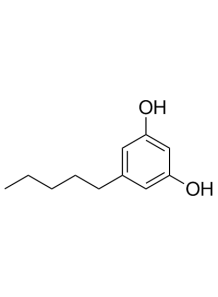Olivetol
- Product Code: 126062
also known chemically as 5-pentylresorcinol, is a naturally occurring phenolic compound found in various plants, including Cannabis species. It serves as a precursor in the biosynthesis of cannabinoids, such as tetrahydrocannabinol (THC) and cannabidiol (CBD)
- -
- -
- -
- -
- -
- -
- -
- -
- -
- -
- -
- -
- -
- -
- -
- -
- -
- -
| Test Name | Specification |
|---|---|
| Appearance | White to off-white solid |
| Identification | Conforms ( |
| Purity (GC) | Min 98.0% |
| Melting Point | 46-48C |
| Ignition Residue | Max 0.5% |
Olivetol, also known chemically as 5-pentylresorcinol, is a naturally occurring phenolic compound found in various plants, including Cannabis species. It serves as a precursor in the biosynthesis of cannabinoids, such as tetrahydrocannabinol (THC) and cannabidiol (CBD). While research on olivetol is still emerging, several potential health benefits have been identified based on its biochemical properties and preliminary studies:
1. Antioxidant Properties
Olivetol has demonstrated antioxidant activity, which means it can help neutralize free radicals in the body. Antioxidants are essential for protecting cells from oxidative stress, potentially reducing the risk of chronic diseases like heart disease and cancer.
2. Anti-Inflammatory Effects
Some studies suggest that olivetol possesses anti-inflammatory properties. By inhibiting certain inflammatory pathways, olivetol may help reduce inflammation-related conditions such as arthritis or inflammatory bowel disease.
3. Neuroprotective Potential
Preliminary research indicates that olivetol may offer neuroprotective benefits. This means it could help protect nerve cells from damage, which is relevant in the context of neurodegenerative diseases like Alzheimer's and Parkinson's.
4. Antimicrobial Activity
Olivetol has shown antimicrobial properties against various pathogens. This suggests potential uses in combating bacterial or fungal infections, although more research is needed to fully understand its efficacy and safety in this regard.
5. Pain Relief (Analgesic Effects)
There is some evidence to suggest that olivetol may have analgesic properties, potentially offering pain-relieving benefits. This could make it a candidate for managing certain types of pain, although clinical studies are necessary to confirm its effectiveness and safety.
6. Potential in Cannabinoid Research
As a precursor to cannabinoids, olivetol plays a role in the biosynthesis of compounds like THC and CBD. Understanding its function can aid in the development of synthetic cannabinoids for medicinal purposes.
Be the first to review this product :-)
Recommend Lab-Service
| Lab Service | Price |
|---|
also known chemically as 5-pentylresorcinol, is a naturally occurring phenolic compound found in various plants, including Cannabis species. It serves as a precursor in the biosynthesis of cannabinoids, such as tetrahydrocannabinol (THC) and cannabidiol (CBD)
Olivetol, also known chemically as 5-pentylresorcinol, is a naturally occurring phenolic compound found in various plants, including Cannabis species. It serves as a precursor in the biosynthesis of cannabinoids, such as tetrahydrocannabinol (THC) and cannabidiol (CBD). While research on olivetol is still emerging, several potential health benefits have been identified based on its biochemical properties and preliminary studies:
1. Antioxidant Properties
Olivetol has demonstrated antioxidant activity, which means it can help neutralize free radicals in the body. Antioxidants are essential for protecting cells from oxidative stress, potentially reducing the risk of chronic diseases like heart disease and cancer.
2. Anti-Inflammatory Effects
Some studies suggest that olivetol possesses anti-inflammatory properties. By inhibiting certain inflammatory pathways, olivetol may help reduce inflammation-related conditions such as arthritis or inflammatory bowel disease.
3. Neuroprotective Potential
Preliminary research indicates that olivetol may offer neuroprotective benefits. This means it could help protect nerve cells from damage, which is relevant in the context of neurodegenerative diseases like Alzheimer's and Parkinson's.
4. Antimicrobial Activity
Olivetol has shown antimicrobial properties against various pathogens. This suggests potential uses in combating bacterial or fungal infections, although more research is needed to fully understand its efficacy and safety in this regard.
5. Pain Relief (Analgesic Effects)
There is some evidence to suggest that olivetol may have analgesic properties, potentially offering pain-relieving benefits. This could make it a candidate for managing certain types of pain, although clinical studies are necessary to confirm its effectiveness and safety.
6. Potential in Cannabinoid Research
As a precursor to cannabinoids, olivetol plays a role in the biosynthesis of compounds like THC and CBD. Understanding its function can aid in the development of synthetic cannabinoids for medicinal purposes.
| Mechanism | - |
| Appearance | - |
| Longevity | - |
| Strength | - |
| Storage | - |
| Shelf Life | - |
| Allergen(s) | - |
| Dosage (Range) | - |
| Recommended Dosage | - |
| Dosage (Per Day) | - |
| Recommended Dosage (Per Day) | - |
| Mix Method | - |
| Heat Resistance | - |
| Stable in pH range | - |
| Solubility | - |
| Product Types | - |
| INCI | - |
Purchase History for
Cart
No products



